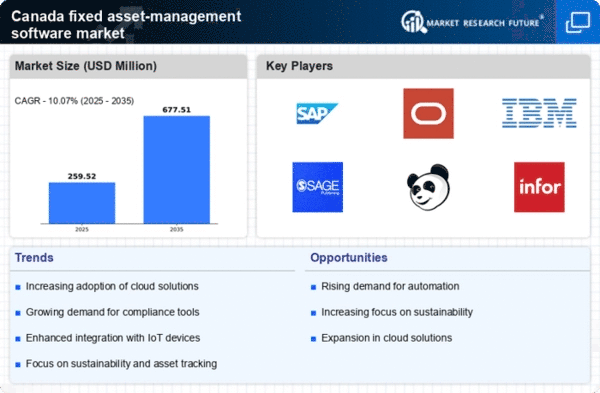Rising Regulatory Pressures
The fixed asset-management-software market is also influenced by rising regulatory pressures in Canada. Organizations are required to comply with various financial reporting standards and tax regulations, which necessitate accurate asset tracking and reporting. The implementation of fixed asset-management software can facilitate compliance by automating reporting processes and ensuring that asset valuations are accurate and up-to-date. As regulatory frameworks become more stringent, the demand for software solutions that can help organizations meet these requirements is likely to increase. This trend suggests that companies will invest more in fixed asset-management software to avoid penalties and ensure adherence to legal standards.
Increased Focus on Cost Management
In the current economic climate, Canadian businesses are placing a heightened emphasis on cost management, which significantly impacts the fixed asset-management-software market. Companies are increasingly aware that effective asset management can lead to substantial cost savings. By utilizing fixed asset-management software, organizations can streamline their asset lifecycle, reduce maintenance costs, and improve depreciation tracking. Reports indicate that businesses that implement such software can achieve cost reductions of up to 20%. This focus on financial efficiency is driving the demand for sophisticated asset management solutions, as firms seek to maximize their return on investment and minimize unnecessary expenditures.
Shift Towards Sustainability Initiatives
The fixed asset-management-software market is witnessing a shift towards sustainability initiatives among Canadian organizations. Companies are increasingly recognizing the importance of sustainable practices in asset management, which includes optimizing resource usage and minimizing waste. This trend is prompting businesses to adopt software solutions that facilitate sustainable asset management, such as tracking energy consumption and lifecycle assessments. As organizations strive to meet environmental goals and enhance their corporate social responsibility, the demand for fixed asset-management software that supports sustainability efforts is likely to grow. This shift not only aligns with consumer expectations but also positions companies favorably in the market.
Growing Demand for Asset Tracking Solutions
The fixed asset-management-software market in Canada is experiencing a notable increase in demand for asset tracking solutions. Organizations are recognizing the importance of accurately tracking their assets to optimize utilization and reduce losses. This trend is particularly evident in sectors such as manufacturing and logistics, where asset visibility is crucial. According to recent data, the market for asset tracking solutions is projected to grow at a CAGR of approximately 12% over the next five years. This growth is driven by the need for real-time data and analytics, which enhance decision-making processes. As businesses seek to improve operational efficiency, the adoption of advanced asset tracking software is likely to become a standard practice, thereby propelling the fixed asset-management-software market forward.
Technological Advancements in Software Solutions
Technological advancements are playing a pivotal role in shaping the fixed asset-management-software market. Innovations such as artificial intelligence (AI) and machine learning are being integrated into asset management solutions, enhancing their capabilities. These technologies enable predictive analytics, which can forecast asset performance and maintenance needs, thereby improving decision-making. As Canadian businesses increasingly adopt these advanced technologies, the demand for sophisticated fixed asset-management software is expected to rise. The integration of such technologies not only streamlines operations but also provides organizations with a competitive edge in managing their assets effectively.
















